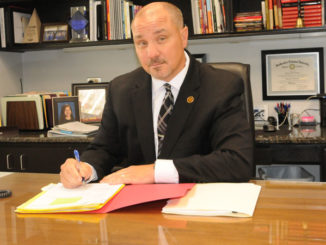
Finding financial peace can be hard, especially on a tight budget in the current economy. But local families are seeing a light at the end of the debt tunnel for the new year thanks to financial planning classes and advice.
Since taking a class at their church last month, Meagan Fast and her husband, Tim, no longer have to worry about overspending or miscommunication. The couple took a course at Life Fellowship Church in Bayou Gauche entitled “Dave Ramsey’s Financial Peace University.” Fast said that the class drastically changed her household’s financial situation, making the couple feel more secure and responsible.
“In a nutshell, it’s about paying off all consumer debt, especially credit cards,” she said. “Once the consumer debt and credit cards are paid off, you focus on paying off your mortgage early.”
Fast said she had always wondered how people were truly able to get out of debt and never understood how it was possible before.
The class was hosted by another local couple whose lives were turned around four years ago by a financial planning discussion.
Michael Noel and his wife, April, thought they were doing pretty well, but realized quickly after taking a one-day class on finances that they were in debt over their heads.
“We really looked at it, we realized we had an enormous amount of consumer debt,” Noel said. “We weren’t really packing a whole lot away – it was kind of a wake up call.”
After learning some steps to clean up their household budget, Michael and April thought it would take about 7-10 years to get debt-free, but it took less than two years.
“When we really started applying the principles…within a year and a half we were so close to being debt free and we were blown away by the impact that it made on our lives,” Noel said. “We felt compelled to share it, so we hosted our first financial class last year.”
Fast said that the class she attended this winter has already made a huge impact on her home life. Now her family holds monthly budget meetings to determine how to spend their funds efficiently.
“One way it helped our marriage is it improved our communication,” Fast said. “We no longer argue when finances are tight because both of us know where the money has actually gone.”
She said that the meetings opened up other communications for her and her husband as well. The meetings gave them an opportunity to talk about things that hold meaning in life besides day-to-day bills, like saving or spending money for long-term goals such as sending the kids to college, family vacation and monthly hobbies.
The Dave Ramsey course also suggests that people create a $1,000 emergency fund immediately, which Fast said lifted weight off of her shoulders when she knew they no longer needed credit cards for emergencies.
Fast said she hopes other couples will choose to take a financial class together in the New Year and that it will change their lives.
Deniese Zeringue, with the LSU AgCenter, said that there are some simple ways that people can keep their finances in check in the New Year, even if they can’t make it to a finance management class.
For those who aren’t ready to cut up all their cards, Zeringue suggests setting aside the credit card with the highest interest rate and trying to pay that off first. Once it’s paid off, use the money you were using to make payments to pay off other cards. Zeringue said an important practice that people can start this year to help save money is “pay yourself first.” Instead of thinking of savings, think about paying yourself a little each month – you’re investing in yourself.
“One of the problems that people have about handling their finances is that they don’t look ahead to see what they have to pay, like electric bills or rent or mortgage,” Zeringue said. “You usually seldom have money for extras, but people buy the extras first and then don’t have enough money for the other stuff – it’s a mismanagement of funds.”
She also suggests printing off your credit score so that you can see exactly how much debt you are in.
“I call it in-your-face finances,” Zeringue said. “If you go on a diet, you take the most unflattering picture and put it where you can see so you won’t eat. If you put your finances in front of you and look at everything you owe and how long it would take to pay it all off…you’ll know what you can and can’t do.”
She said that people need to realize that small spending – or small saving – can really add up. If you spend $50 each month on something frivolous, that is $600 for the year, but you could also save that.
“People have to add it up – there are always things you can get cheaper,” Zeringue said.
She suggests using the federal website www.annualcreditreport.com, which offers free credit reports to individuals multiple times per year. For more financial advice, visit www.lsuagcenter.com.




Be the first to comment